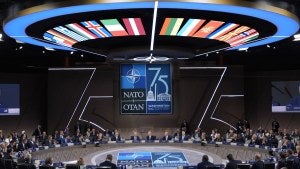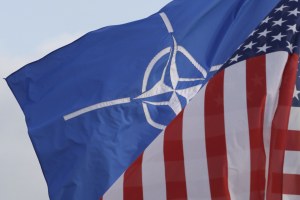Despite President-elect Donald Trump’s aversion to alliances, foreign policy professionals across the American political spectrum believe they greatly benefit the United States.
Since Donald Trump won the 2024 US presidential election, allies of the United States have been preparing for an unpredictable next four years. Those in Europe in particular fear that a second Trump administration could reorient US foreign policy away from traditional alliances and toward more populist, authoritarian leaders, like Hungary’s Viktor Orban, Russia’s Vladimir Putin, and Argentina’s Javier Milei.
A recent Chicago Council on Global Affairs-University of Texas survey, conducted August 7–October 3, finds that like the general public, US foreign policy professionals and opinion leaders across the political spectrum believe US alliances benefit the United States. They are also more likely to consider US diplomatic efforts—rather than military efforts—to principally benefit from US security alliances, underscoring the value of these relationships to achieving US interests beyond the realm of security.
Key Findings
- Majorities of foreign policy opinion leaders across the board believe US security alliances either solely benefit the United States or benefit both the United States and its allies.
- Experts see more than security benefits to these relationships. More among the majority who say alliances are beneficial say it is because they strengthen US diplomatic efforts, while fewer cite their ability to deter attacks against the United States.
- Solid majorities of foreign policy leaders would support using US troops to defend US allies South Korea, Japan, Germany, and the Baltic NATO members, in contrast to declining support among the US public.
- Opinion leaders and the American public are divided along partisan lines on whether to send US troops to defend Israel if it is attacked by its neighbors or Iran.
Opinion Leaders across Party Lines Champion US Alliances
President-elect Trump’s negative opinion of US alliances is well-known. During his first term in the White House, he criticized allies for “free-riding” on American security guarantees, insisted they pay more for US security assistance, and even threatened to withdraw from US security alliances. With the second coming of Trump, experts also expect potentially substantial swings in US relations with official and unofficial allies. This includes pressure from the Oval Office for allies, particularly those in NATO, to increase defense spending and take a greater role in regional conflicts.
This survey among 471 foreign policy professionals who influence policy and public debate—including government officials, think tank experts, academics, business leaders, media professionals, nongovernmental organization staff, and religious leaders—shows they differ with Trump when it comes to the topic of alliances.
Large majorities of 85 percent or more among self-identified Democratic, Republican, and Independent opinion leaders say US security alliances either mostly benefit the United States on its own or benefit both the United and its allies. This support is higher than that expressed by their corresponding partisans among the public: 74 percent of Democrats, 62 percent of Independents, and 55 percent of Republicans among the public express positive views about alliances.
Strengthening Diplomatic Efforts Seen as Great Benefit from Alliances
The bulk of opinion leaders who think alliances mostly benefit the United States and its allies (more than 85% of the overall leaders’ sample) were further asked why they held this view. Interestingly, even though these leaders were asked about the benefits of security alliances, the most frequent response was that alliances strengthen US diplomatic efforts around the world (56% Democrat, 43% Independent, and 42% Republican). A third of Republican opinion leaders (33%) and fewer Independent (28%) and Democratic (17%) leaders say allies strengthen US military efforts around the world. This is similar to perceptions among the public: those everyday Americans who see alliances as beneficial to the United States and its allies (64% of the overall sample) also think that it strengthens US diplomatic efforts (57%) and American global military efforts (50%).
For both the opinion leaders and the public who say alliances are beneficial to the United States and its allies, the deterrent and burden-sharing aspects of alliances are less recognized. In fact, the public is more likely than opinion leaders to credit US participation in alliances with preventing the United States from being attacked (38% public, 7% on average among opinion leaders), strengthening US security at home (31% public, 12% on average among opinion leaders), and decreasing the cost of defense for the United States (19% public, 8% on average among opinion leaders). For the most part, these views are distributed similarly across partisans, though Democrats are most inclined to credit alliances with fortifying diplomatic efforts.
For Minority Who Consider Alliances Disadvantageous, Costs Are Key
Among those who say alliances mostly benefit US allies or benefit neither the United States nor allies (10% of opinion leaders and 35% of the general public), most seem concerned about costs. Five in 10 opinion leaders (49%) on average and nearly half the public (47%) say allies do not pay their fair share. An additional 21 percent of these opinion leaders on average and 45 percent of the public think alliances increase the cost of defense for the United States. Republicans are particularly inclined to say allies do not pay their fair share (84% among Republican opinion leaders, 64% among everyday Republicans) (see appendix table 1).
Majorities of Opinion Leaders Support NATO
Despite Republicans’ concerns about costs of alliances in general, in the specific context of NATO, majorities across the political spectrum continue to believe that the United States should maintain or even increase its commitment to the transatlantic alliance. While all partisans support continuing this commitment, Democratic opinion leaders are the most emphatic champions of NATO: more than nine in 10 (96%) of them say the United States should maintain or increase the US commitment.
Republican opinion leaders are only slightly less supportive, with eight in 10 combined endorsing either maintaining (70%) or increasing (10%) the US commitment, and it is a similar story with Independent opinion leaders (57% maintain, 24% increase). Notably more Republican (19%) and Independent opinion leaders (15%) would like to decrease the US commitment (compared to 4% of Democratic leaders), but few in any group support withdrawing.
This pattern is similar among the US public: at least two-thirds among everyday Democrats (88%), Independents (73%), and Republicans (68%) favor maintaining or increasing the US commitment to NATO. And while few support the United States withdrawing entirely (9% overall) or decreasing its commitment to NATO (13% overall), support for decreasing is higher among rank-and-file Republicans (20% decrease, 10% withdraw) and Independents (13% decrease, 12% withdraw entirely).
Opinion Leaders Express Strong Support for Defending Allies . . .
Allies around the world have questioned the credibility of US security guarantees not only since the previous Trump administration but also the tumultuous US withdrawal from Afghanistan under President Joe Biden. Yet large numbers of foreign policy leaders say the United States should honor such commitments. Solid bipartisan majorities say they would support using US troops to defend US allies, including South Korea if attacked by North Korea; Germany and the Baltic NATO members if attacked by Russia; Japan if in a conflict with China over disputed islands; and Taiwan if it is attacked by China.
Majorities of the US public support coming to the defense of South Korea, Baltic allies, and Germany, but at much lower levels than these foreign policy professionals. In fact, public support for defending allies has diminished since Russia invaded Ukraine. In addition, everyday Americans tend to oppose getting into a conflict with China, whether in a dispute with Japan or Taiwan.
. . . With the Exception of Strong Partisan Division on Israel
Opinion leaders and the American public are divided along partisan lines on whether to send US troops to defend Israel if it is attacked by its neighbors or Iran. Majorities of Republican leaders and GOP supporters among the public would favor the United States sending troops to assist Israel if it were attacked by its neighbors (58% leaders, 55% public) or by Iran (69% leaders, 53% public), while majorities of Democrats and Independents—elite and public alike—oppose such uses of force. Across the board, the share of elites and public that favor defending Israel under these circumstances has declined in recent years (see appendix table 2). However, Democrats and, to a lesser extent, Independents across elites and the general public favor the use of US troops to enforce a peace agreement between Israel and the Palestinians.
Conclusion
Overall, US foreign policy professionals and opinion leaders broadly support US alliances and believe they strengthen US diplomatic efforts abroad. The data show they view alliances even more favorably than the general public, who also support this pillar of US foreign policy. Strikingly, the data further indicate that partisan differences in opinion leader attitudes are relatively minimal, as majorities of Democratic, Republican, and Independent foreign policy professionals all think alliances benefit the United States, favor maintaining or increasing the US commitment to NATO, and support defending allies if they are attacked by adversaries. These findings suggest that even as polarization drives Democratic and Republican attitudes apart on many foreign policy issues, some important international issues remain the subject of substantial cross-party agreement.
Looking ahead, Trump’s return to the presidency will place on the table a significant wild card when it comes to US policy regarding alliances, as he has routinely questioned their value. But it is notable that even after eight years of Trump leading the Republican Party, most Republican opinion leaders maintain a more positive view of alliances than him. With so much turmoil in the world, in places ranging from Ukraine to the Middle East, American opinion leaders and the public seem to believe it’s better to have friends and allies than go it alone.
Table 1: Reason for Alliance Drawback
You said that alliances either mostly benefit our allies or benefit neither. Among the following, which best represents your view?
| Overall | Republican | Democrat | Independent | R-D Gap | |
|---|---|---|---|---|---|
| 2024 Public | 45 | 46 | 41 | 48 | 5 |
| 2024 Elites | 17 | 16 | 37 | 9 | -21 |
| Overall | Republican | Democrat | Independent | R-D Gap | |
|---|---|---|---|---|---|
| 2024 Public | 47 | 64 | 30 | 44 | 34 |
| 2024 Elites | 44 | 84 | 19 | 44 | 65 |
| Overall | Republican | Democrat | Independent | R-D Gap | |
|---|---|---|---|---|---|
| 2024 Public | 26 | 29 | 23 | 24 | 6 |
| 2024 Elites | 7 | 0 | 10 | 7 | -10 |
| Overall | Republican | Democrat | Independent | R-D Gap | |
|---|---|---|---|---|---|
| 2024 Public | 40 | 37 | 40 | 42 | -3 |
| 2024 Elites | 32 | 0 | 34 | 39 | -34 |
Table 2: Support for Use of US Troops
There has been some discussion about the circumstances that might justify using US troops in other parts of the world. Please give your opinion about some situations. Would you favor or oppose the use of US troops:
| Overall | Republican | Democrat | Independent | R-D Gap | |
|---|---|---|---|---|---|
| 2024 | 54 | 48 | 62 | 51 | -17 |
| 2019 | 59 | 61 | 64 | 52 | -3 |
| Overall | Republican | Democrat | Independent | R-D Gap | |
|---|---|---|---|---|---|
| 2024 | 63 | 45 | 73 | 55 | 28 |
| Overall | Republican | Democrat | Independent | R-D Gap | |
|---|---|---|---|---|---|
| 2024 | 41 | 55 | 35 | 35 | 20 |
| 2021 | 53 | 72 | 41 | 49 | 31 |
| Overall | Republican | Democrat | Independent | R-D Gap | |
|---|---|---|---|---|---|
| 2024 | 37 | 58 | 34 | 36 | 24 |
| 2018 | 55 | 82 | 52 | 52 | 30 |
| Overall | Republican | Democrat | Independent | R-D Gap | |
|---|---|---|---|---|---|
| 2024 | 42 | 53 | 34 | 42 | 19 |
| Overall | Republican | Democrat | Independent | R-D Gap | |
|---|---|---|---|---|---|
| 2024 | 48 | 69 | 45 | 45 | 24 |
This analysis is based on data from two surveys designed by researchers at the Lester Crown Center on US Foreign Policy at the Chicago Council on Global Affairs.
Public data comes from the 2024 Chicago Council Survey of the American public on foreign policy. The survey was conducted June 21–July 1, 2024, by Ipsos using its large-scale nationwide online research panel, KnowledgePanel, in English and Spanish among a weighted national sample of 2,106 adults 18 or older living in all 50 US states and the District of Columbia. The margin of sampling error for the full sample is ±2.3 percentage points, including a design effect of 1.1229. The margin of error is higher for partisan subgroups (±4.2 points for Republicans, ±3.9 points for Democrats, and ±3.8 points for Independents) or for partial-sample items.
Opinion leaders data comes from the 2024 Chicago Council-University of Texas Survey of Foreign Policy Opinion Leaders. The opinion leaders survey was conducted by Verasight from August 7–October 3, 2024. The sample consists of 471 foreign policy leaders employed across a variety of sectors: executive branch agencies, Congress, academia, think tanks, the media, and interest groups (including nongovernmental organizations, religious institutions, labor unions, and business). The sampling frame was designed to replicate prior surveys of foreign policy opinion leaders conducted by the Chicago Council and the University of Texas from 2014 through 2022, which themselves aimed to replicate the original series of Council surveys of opinion leaders conducted between 1978 and 2004. The data is weighted equally by group size, duplicating the approach taken in 2022.
In both surveys, partisan identification is based on how respondents answered a standard partisan self-identification question: “Generally speaking, do you think of yourself as a Republican, a Democrat, an Independent, or what?”
The 2024 Chicago Council Survey is made possible by the generous support of the Crown family, the Korea Foundation, and the United States-Japan Foundation. The 2024 leaders survey is made possible by the generous support of the LBJ School of Public Affairs at the University of Texas-Austin as well as the Strauss Center for International Security and Law and the Clements Center for National Security.










Related Content
 Public Opinion
Public Opinion
Results and analysis of the Council's annual survey of American views on foreign policy.
 Public Opinion
Public Opinion
While supporters of both parties see benefits in US security agreements, Republicans tend to be more concerned about the associated costs.
 Public Opinion
Public Opinion
The public also remains in favor of maintaining long-term military bases abroad.
